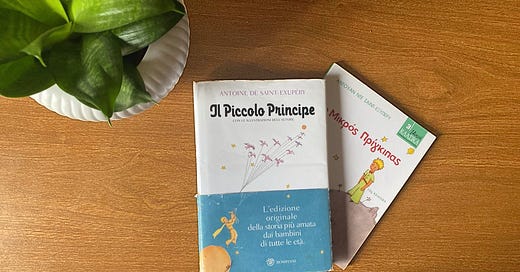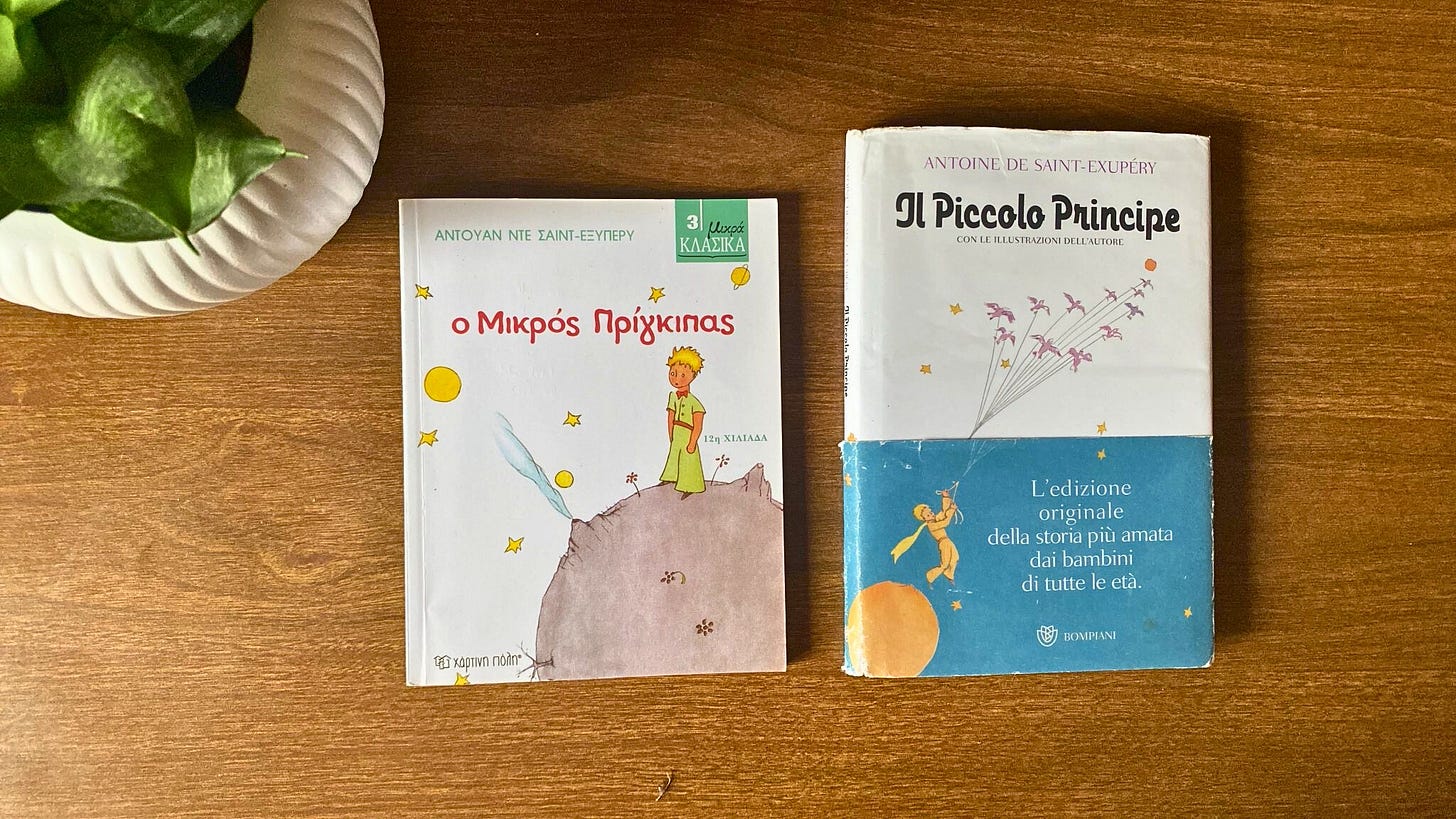How can I fit my love for this book in words? And even if I find the right words, how can I fit all of them in a single post, without it ending up being the size of an essay? And if I find the right words, and I manage to make a decent size post, will it ever convey even a fraction of the book’s magic? I will never find the right words. And whatever words I choose, they will never give the book and the author, the credit they deserve. Having that in mind, and having set the bar for the words to come very low, I will try to share my thoughts on this tiny book, whose size is inversely proportional to its value.
Trying to think where to begin, the inner dialogues of my mind look something like this:
- Is it a children’s book? Yes, it is.
- Does this mean it is not meant for adults? Definitely not, maybe it is actually more for adults than for kids.
- Sooo, should children read it or not? Of course they should, don’t be silly.
Since these inner dialogues did not lead to an interesting introduction, let me start with some of the boring reasons you should read this book. Regardless of the list you choose to trust, the little prince is one of the most sold books of all times and rightfully so. I chose to reference this list from James Clear1 , because it clearly states that “some religious and political books [are excluded from the list because] sales numbers for these books are nearly impossible to track”. Hence, from all the books that are possible to track, according to Clear’s list, the little prince ranks 4th in all-time sales. But even if we include the Bible, the Quran and the Quotations from Chairman Mao, that are believed to rank higher, the little prince still makes it to the top 10. Of book sold. Ever. As in, all times. But enough about numbers. Actually, it is quite ironic to talk numbers and rankings in a post about the little prince, because if anything, the book is trying to teach us how we should not try to measure everything in numbers.
The little prince, who by the way doesn’t have a name, is a young boy who travels the world. To be exact, he travels the universe. He jumps from planet to planet and encounters different people, animals, aliens and even… nothingness. Sometimes what he encounters is interesting, sometimes is not. But the little prince is always curious. He always asks questions. And as the author will clearly warn you, the little prince will never stop asking until he gets an answer. And not just any dismissive answer: the little prince will demand a satisfying answer. Mind you, what children consider a satisfying answer, might be light years away, from what adults would compromise with.
My experience is that the whole book is a build-up to chapter XXI2, where the little prince lands in a planet where he meets a fox. The fox will teach him about friendship and love. Not love in a romantic way, just pure love, like the dog that will run towards the owner who comes back home from work, as if they were coming back from a 2-year absence in the front lines of a war. The fox will also teach the little prince what sentimental value is, and why a rose that you care about, even though it looks like all other roses, and even though it smells like all other roses, it is nothing like any of the other roses, because they mean nothing to you. They have no sentimental value to you. On the contrary, even though your rose smells like all the other roses, and looks like all the other roses, it means the world to you.
The fox will teach him how to become friends with her3, or in her words, tame her. She will teach him the value of consistency and the thrill of anticipation. And she will do it in such a sweet way, that an adult would probably have forgotten how to do. She will guide him to visit her every single day at the same time. Because consistency matters. It matters because it allows excitement to build up, and when the time actually comes and your person shows up, the excitement bursts and with that burst, comes the exhaustion that the release of the accumulated adrenaline will cause4. And when that happens again and again, before you know it, that person (or that fox) is your friend. And just like the little prince’s rose, the fox will have a special place in his heart, despite her looking exactly like all other foxes.

The little prince is a children’s book for adults. It is about a young boy, who without knowing, refuses to become cynical, or even better, refuses to become a realist. That is how we like to hide our cynicism once we grow older. We call it realism. We call ourselves realists, pragmatists and all sorts of fancy words, that basically mean that we stopped dreaming, stop trying, stop aspiring to great things. In other words, compromising. It is a bit of an admission of loss, now that I come to think about it. In the worst-case scenario, not only we stop dreaming, but we also encourage others to do the same, trying to convince them to also think realistically.
The little prince is a book honoring children for being curious, for being naive, for being authentic, for being pure. It is a book honoring children for being children. It is also a book that tries to remind adults, not to be so cynical, not to be so pragmatic. Trying to remind them, that not everything has a price, not everything can be measured, that some things only have sentimental value and that is more than enough. The little prince tries to remind adults, not to be so… adults.
I have read this book multiple times, in two languages -or maybe three, I am not sure5- and if I become somehow comfortable in another one, I will also read it in that. I was very excited to find out that one of my friends collects “little princes” from different locations around the world. Now everywhere I go -and no matter where, I will anyway always visit a bookstore- I will look if I can get her a copy. I think I actually enjoy the search, the gifting and the fact that there is someone else out there who appreciates this book so much, more than she enjoys having the book in her collection. Maybe that is not true, but in my mind it is. I love gifting books to my friends and I am very happy when I realize that, I found a book that my friends will also appreciate. Now combine that, with finding out that the book I am about to give is one of my favorites: what a feeling.
I like the little prince because it carries so much truth, and it lays it in such a simple, almost silly way that you don’t realize the depth of what you just read. He will question things like, why people value money, without saying it out loud. But through his unsuccessful attempts to understand why and his relentless efforts to get satisfactory answers, he shows you that maybe he is right not to understand; because maybe there is no real argument to quantify everything. Yet, as we grow up, we pursue numbers more and more, being it money, titles or whatever else, forgetting that numbers are just a means to an end, and not the end goal itself.
If you haven’t read the little prince, I really hope this post convinced you to do so.
Sincerely,
- The Naive Ignorant
Update: As if it was planned, a week after I published this post, I received as a gift, another copy of the little prince in English. If that isn’t a coincidence, I don’t know what is.
James Clear is the author of the extremely successful book titled, Atomic Habits, that it so happens, I just finished reading.
That is all the Latin I know by the way. I am using the Latin enumeration firstly, to show off my Latin, and secondly, because that is how the chapters are numbered in all the editions of the little prince that I have gotten my hands on.
I say her, but I am pretty sure the author has not assigned a sex to the fox.
If you read my post about the airport paradox, then this rollercoaster of feelings probably sounds familiar.
Greek, English and maybe French. I have a copy in Italian, but I have not read it.







I actually haven’t read this book, but it’s SO popular here in Spain too. I’m definitely going to add to my list! Seems a bit reminiscent of The Alchemist, a seemingly simple story with a deeper, important life message.
Nicely written review! I immediately feel like reading the book again.... but not in the Greek language 😉